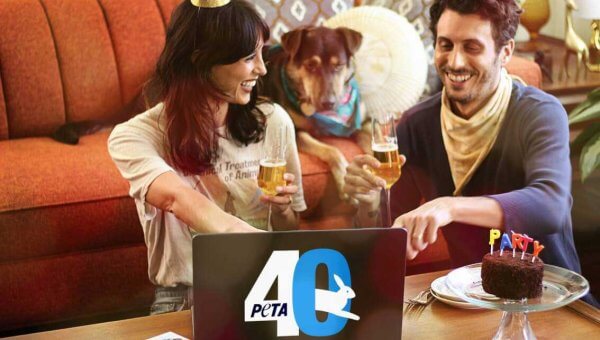40 Times PETA Blew the Lid off the Things Animal Abusers Don’t Want You to See
PETA’s undercover investigations and exposés are a big part of what we’re known for. And since the first one in 1981, they’ve resulted in quite a lot: thousands of criminal charges filed, hundreds of U.S. Department of Agriculture (USDA) citations issued, and dozens of facilities shut down. So to commemorate our 40th anniversary, we’re taking a look back at some of our most shocking undercover investigations and exposés and how they helped us and other PETA entities win victories for animals.
1981
The first PETA undercover investigation (which was also the first-ever animal rights undercover investigation) took place inside a U.S. laboratory. Nerves in monkeys’ spinal cords were severed, rendering one of their limbs useless—then they were electroshocked and pinched with pliers. They were kept inside filthy cages with wire flooring so that food fell through to the feces beneath. Dubbed the Silver Spring monkeys case and known as “the case that launched PETA,” the investigation resulted in the first-ever search and seizure warrant for a laboratory, the first-ever conviction of an animal experimenter on animal abuse charges, the first-ever revocation of federal research funds because of cruelty to animals, and the first-ever case concerning animals in laboratories to be considered by the U.S. Supreme Court.

1985
PETA obtained video footage exposing how in the University of California–Riverside’s psychology labs, animals such as Britches—an infant monkey whose eyes had been sewn shut—were subjects of sight-deprivation experiments. After we released the footage, the school’s psychology department no longer allowed experimenters to sew baby monkeys’ eyes shut. Heat was installed in the outdoor primate colony, the principal experimenter resigned, and Britches was rescued.
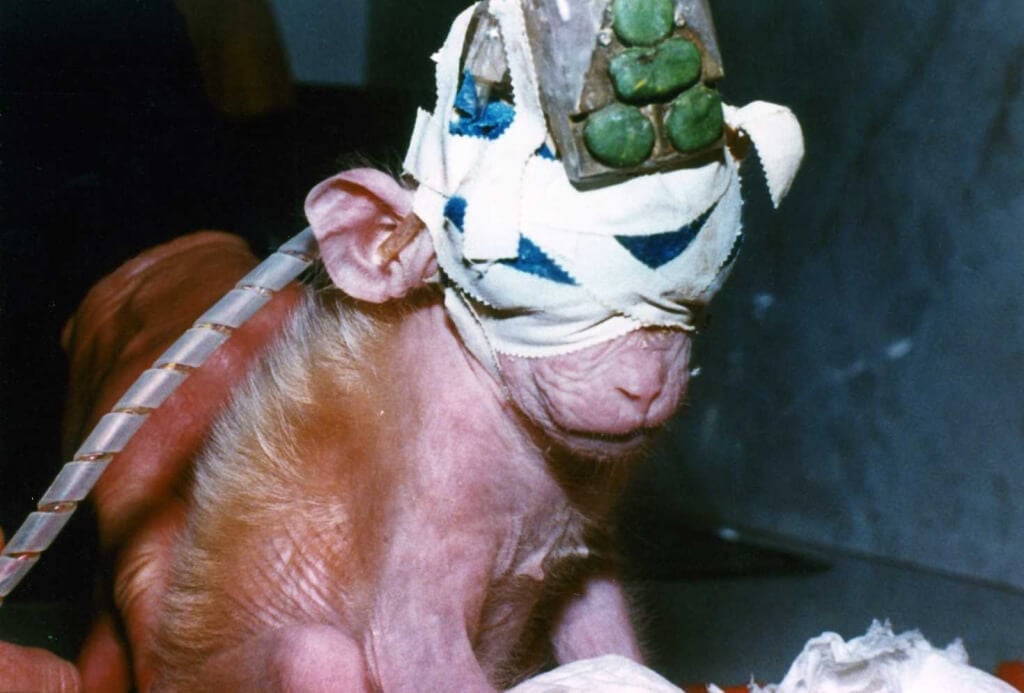
1986
A PETA investigation into Gillette’s animal-testing laboratory revealed that employees were dripping chemicals into rabbits’ eyes and that rats were left convulsing following intensive forced inhalation of aerosol products. Gillette ended all animal tests in 1996 in response to our persuasive campaign.
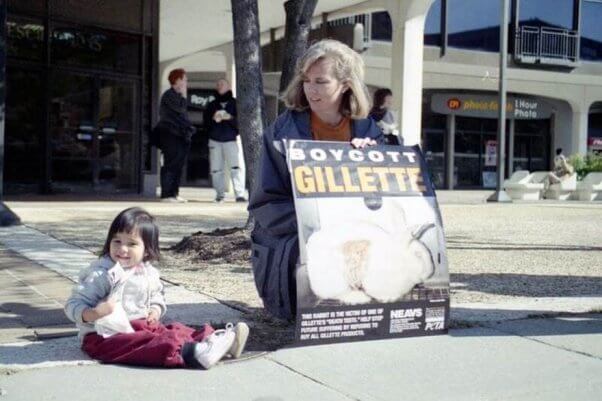
1987
Jane Goodall—the world’s foremost primate specialist—called for the closure of SEMA after undercover video footage released by PETA revealed abysmal conditions in the research facility. And after PETA’s exposé was featured on international television, SEMA ended the total-isolation confinement of baby chimpanzees, four of whom were rescued from its laboratory. In 2012, under pressure from PETA, SEMA—by then known as BIOQUAL—ended all use of chimpanzees.
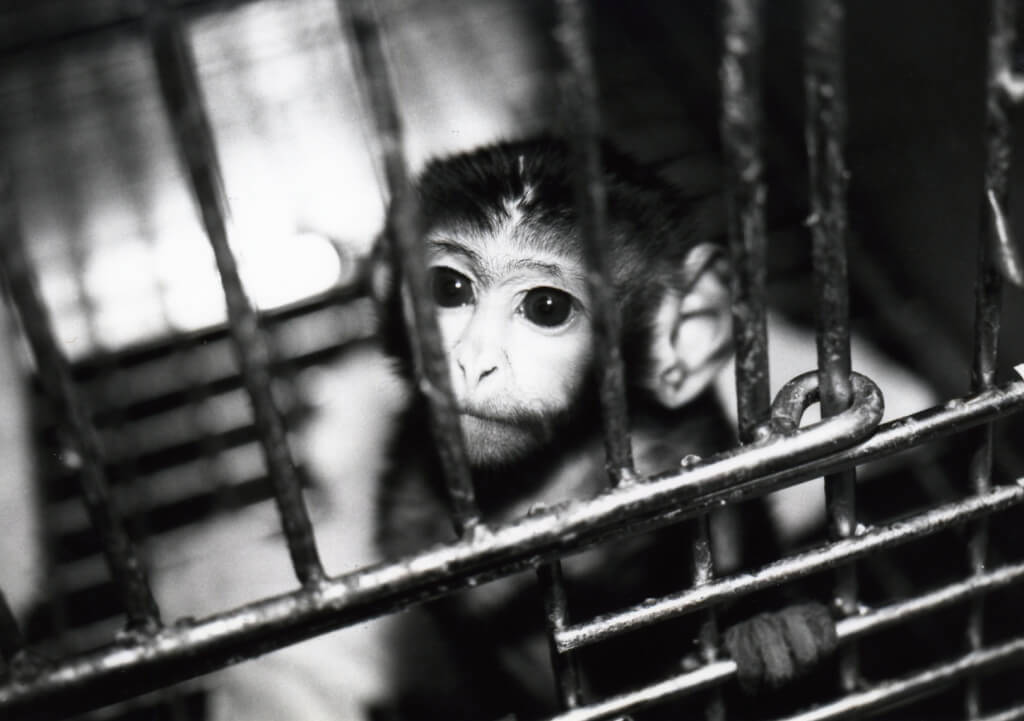
1988
A year-long PETA undercover investigation into Biosearch, a cosmetics and household product testing laboratory, uncovered more than 100 violations of federal and state anti-cruelty laws. The ensuing campaign led to an end to all animal tests by Benetton and to the formation of PETA’s Caring Consumer Project (now called Beauty Without Bunnies), which has led more than 5,000 companies to commit to never testing their products on animals.

Also in 1988, our investigation into a Stevensville, Montana, fur farm revealed that hundreds of beavers were confined to concrete pens and starving to death. After our exposé, all the beavers were rescued and images of the site were used in anti-fur campaigns.
1989
PETA exposed the backstage beating of orangutans by Las Vegas entertainer Bobby Berosini, who used these gentle, endangered primates in a nightclub act. His captive-bred wildlife permit was subsequently suspended and later canceled by the U.S. Department of the Interior, and the show was closed.
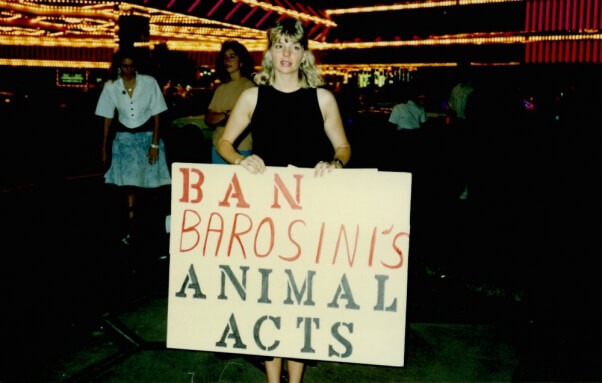
Also in 1989, PETA exposed hideous and scientifically invalid experiments at Texas Tech University in which experimenters deprived cats of sleep by locking them inside freezing rooms or making them balance on a beam of wood suspended in a 55-gallon drum of water overnight. We reported the lab to the National Institutes of Health (NIH), asking that the funds for the experiments be withdrawn. Footage of the experiments was widely distributed, and the cats were rescued.
1991
PETA exposed General Motors’ crash tests involving live pigs and baboons. As a result, the company—one of the largest automakers in the world—agreed never to perform such tests again. Our work ended all crash tests on animals worldwide.
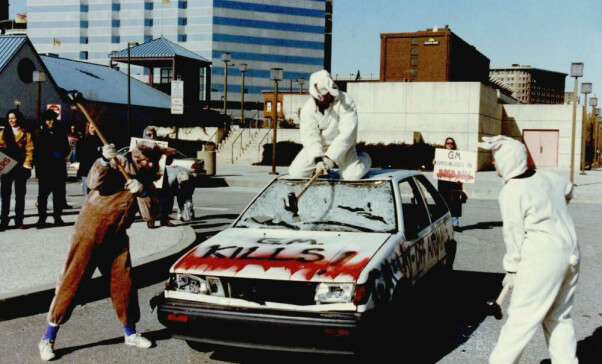
1992
PETA sent an undercover investigator into two Pennsylvania slaughterhouses and revealed that the then-34-year-old Humane Methods of Slaughter Act—developed to reduce the suffering of some animals killed in the meat industry—is rarely enforced. Images of extreme crowding, confinement, forced insemination, castration without any pain relief, and tail-docking (among other atrocities) were broadcast throughout the media, allowing many people to see inside a slaughterhouse for the first time.
1994
For the first time in U.S. history, a fur farmer was charged with cruelty to animals after a 1994 PETA investigation captured an Indiana fur farmer on tape using genital electrocution as a killing method. Use of this cruel killing method was consequently ended.
1998
Following a PETA undercover investigation into Belcross Farm—a pig-breeding facility in North Carolina—Camden County Superior Court made history by handing down the first-ever felony indictments for cruelty to animals by farm workers. The footage obtained by our investigator was widely distributed through a video narrated by actor James Cromwell, leading many viewers to go vegetarian.
Also in 1998, after Ingrid visited Taiwan and exposed the shocking conditions for dogs in pounds, we successfully campaigned to have the country pass its first-ever law against cruelty to animals.
1999
A PETA investigator went undercover at Carson & Barnes Circus and videotaped an elephant-training session. The investigator documented that the circus’s animal care director attacked elephants with steel-tipped bullhooks, shocked them with electric prods, and instructed other handlers to beat the elephants until they screamed in pain. Many likely remember the footage, which continues to inspire countless viewers to avoid circuses that use animals.
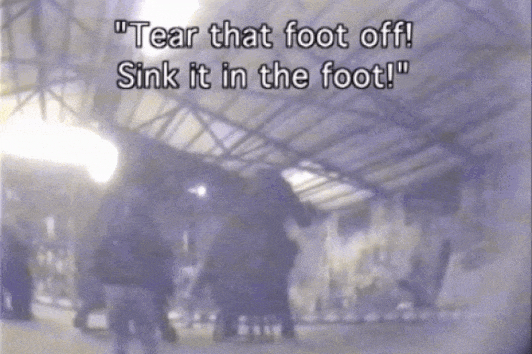
2002
PETA launched “Meet Your Meat,” the first-ever comprehensive video documenting the abuse of farmed animals, using undercover footage from filthy farms and slaughterhouses. “Meet Your Meat,” narrated by actor Alec Baldwin, has become one of the most widely viewed animal rights videos in the world.
2003
An 11-month PETA undercover investigation into an Iams pet food contract laboratory revealed that Iams was funding painful experiments on dogs and other animals, even though the tests were not required by law. Among other instances of abuse, dogs’ vocal cords were cut out because their whining was “bothering” the laboratory director. Iams, which was then a subsidiary of Procter & Gamble (and is now owned by another company), withdrew its business from the facility. The laboratory was cited for 40 violations of federal law and fined $33,000.
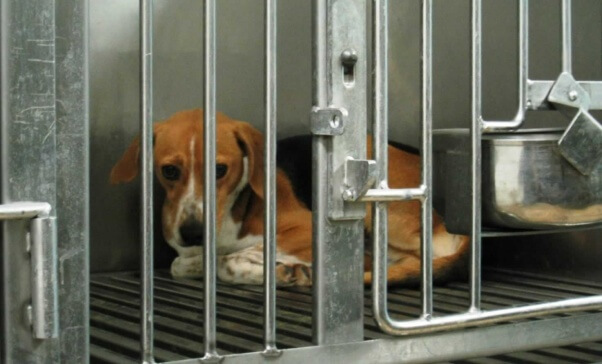
2005
Using a hidden camera, a PETA investigator documented the treatment of chickens at a Tyson Foods slaughterhouse in Alabama, where an estimated 150,000 were killed daily. Birds were scalded to death, their heads were smashed open, dying birds were thrown around like footballs, and chickens were abused in other ways. The footage has been viewed more than 100,000 times. Tyson Foods later began negotiating with PETA regarding the implementation of controlled-atmosphere killing, which renders birds unconscious before they’re slaughtered.
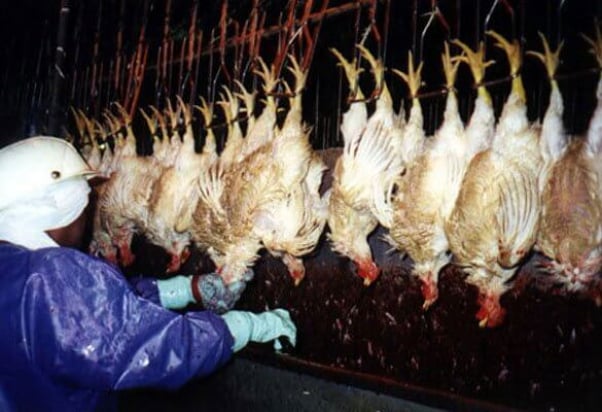
2008
PETA’s investigation into Aviagen Turkeys, Inc., part of the self-proclaimed “world’s leading poultry breeding company,” reveals that workers tortured, mutilated, and maliciously killed turkeys. Three former employees were indicted on felony cruelty-to-animals charges—the first felony charges for abusing factory-farmed birds in U.S. history—and two became the first farmers to be convicted of abusing turkeys. One man was sentenced to a year in jail—the strongest penalty levied for abusing a farmed animal in U.S. history—and all three were barred from owning or living with animals for five years.
2009
PETA released eyewitness footage showing that elephants used by Ringling Bros. and Barnum & Bailey Circus were whipped, beaten, and yanked by heavy, sharp steel-tipped bullhooks behind the scenes prior to performances. Ringling Bros. has since shut down.
2010
PETA investigated Sun Pet Ltd., an Atlanta-based small animal factory farm that supplied mice, rats, guinea pigs, hamsters, and others to pet stores, including Petco and PetSmart. The investigation revealed that a worker put hamsters in a plastic bag and bashed the animals against a table in a crude attempt to kill them as well as that Petco and PetSmart stores returned sick and injured animals, sometimes without food or water, instead of providing them with veterinary care. Some animals died as a result. The Georgia Department of Agriculture subsequently placed Sun Pet on probation for two years and imposed a penalty of $3,000 to be paid immediately if the company was found to be in significant, repeated, or similar violation of the state’s Animal Protection Act.
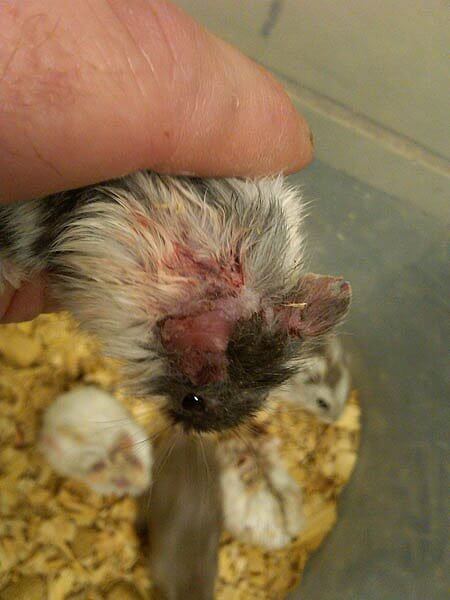
Also in 2010, PETA released details of our lengthy undercover investigation into Professional Laboratory and Research Services, Inc.—where workers used pliers to yank teeth from the mouth of a struggling dog who had been denied proper anesthesia; flung cats into cages; ignored the deafening, desperate cries of animals like Clementine, a sweet senior Dalmatian; and left rabbits to suffer from painful burns and sores in urine-soaked cages. We filed a complaint with the USDA, and a week later, the North Carolina facility was closed and released its more than 200 dogs and cats to adopting families.
2012
After a two-month PETA undercover investigation into Global Captive Breeders documenting that thousands of animals were being neglected and dying and many more were being cruelly killed, law-enforcement officials raided the Lake Elsinore, California, company, which bred and sold reptiles and rats for the pet trade. This resulted in the largest rescue of neglected rats in U.S. history and the largest seizure of animals, including more than 600 reptiles and 18,000 rats, ever in California. Local authorities charged the owner and manager with a total of 223 counts of felony cruelty to animals and related charges.
2013
In a first-of-its-kind look at the commercial slaughter of crustaceans, a PETA investigation revealed that workers at Linda Bean’s Maine Lobster slaughterhouse ripped fully conscious crabs and lobsters apart and boiled surviving crabs alive. After CBS released the footage, it wasn’t long before social media influencers ripped into Linda Bean. Faced with the negative attention, canceled business contracts, PETA protests, and a barrage of nearly 76,000 e-mails from our members, Bean sold the slaughterhouse that PETA had investigated, and it was later closed down when the new owners couldn’t persuade people to work there. She also sold the lobster distribution business to her employees and closed many of the lobster roll eateries.
2014
More than a million pigeons die in Taiwan every year after they’re released in the middle of the ocean and forced to fly back home, even in typhoon-strength winds. It’s all part of Taiwan’s pigeon-racing industry, which PETA undercover investigators infiltrated, exposing its cruelty and spurring a national sweep of pigeon-racing clubs. Police confiscated cash and equipment and froze more than $4.5 million in apparently illegal gambling proceeds, and at least 239 people faced prison or fines—the most ever prosecuted as a result of a single PETA investigation.
2015
PETA investigated crocodile and alligator factory farms in Zimbabwe and Texas in 2015, exposing the appalling conditions in which animals were raised and killed for Hermès’ “luxury” goods. Alligators were packed into dank pools and crocodiles were kept in crowded, barren concrete pits for months or even years before finally being slaughtered for their skins. At Lone Star Alligator Farm in Texas, the investigator saw workers repeatedly shoot alligators in the head with a captive-bolt gun, cut into more than 500 conscious alligators as some struggled to escape, and stab conscious alligators to try to dislocate their vertebrae. More than 42,000 concerned supporters have since urged Hermès to stop selling items made using crocodile and alligator skins.
Also in 2015, PETA released video footage of cruelty to sheep on farms that were part of the Ovis 21 network in Argentina, which supplied wool to clothing company Patagonia. The eyewitness footage shows workers sawing through conscious lambs’ necks with their knives, causing them to bleed and vomit. PETA’s video exposé led Patagonia to cut ties with Ovis 21.
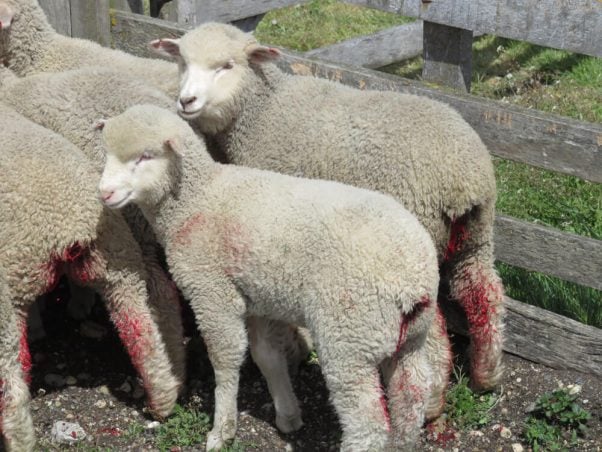
PETA has routinely proved that “humane meat“ is a myth, including with a 2015 investigation into a Whole Foods Market pork supplier revealing that pigs were kept in crowded conditions, suffered from lameness and rectal prolapses, and denied prompt veterinary care. Sweet Stem Farm was expected to meet higher welfare standards than most of the pig farms that supply Whole Foods, but our findings exposed glaring discrepancies between the mandated standards and the reality for pigs there.
2016
In a landmark case following the release of PETA’s first Australian wool exposé, six shearers were charged with 70 counts of cruelty to animals—the first time in history that any shearer had been charged with cruelty to animals. The exposé documented that wool industry workers in Australia beat sheep in the face with electric clippers and punched and stomped on their heads and necks. All six defendants admitted guilt.
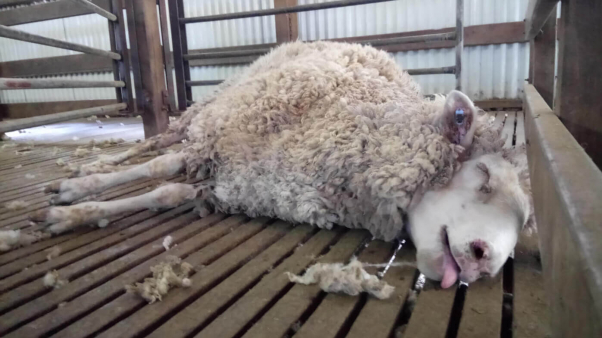
Also in 2016, PETA released a three-month undercover investigation documenting that animals were frozen alive and gassed by the dozens at Holmes Farm, a massive animal dealer in Pennsylvania that supplied hamsters, rabbits, gerbils, chinchillas, ferrets, and other small animals to pet stores across the eastern U.S., including Petco and PetSmart. After learning of our findings, those chains dropped the supplier. (We, however, haven’t dropped our efforts to push them and other chains to end the sale of all live animals.) The USDA cited Holmes Farm for 117 violations of 14 different federal regulations, and the manager pleaded guilty to two counts of cruelty to animals.
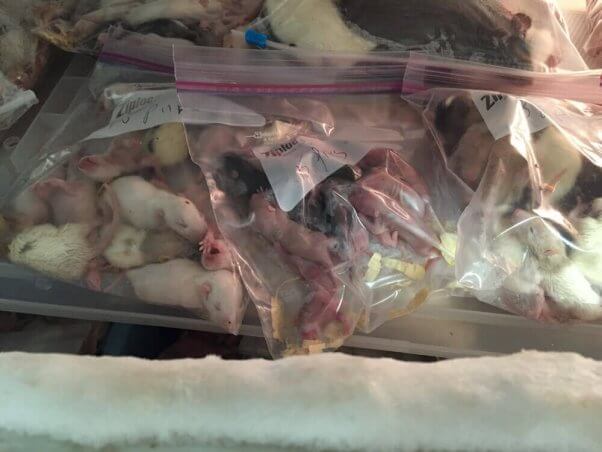
PETA also released an eyewitness investigation into Dade City’s Wild Things (DCWT), a roadside zoo in Florida that sold encounters with baby animals and forced tiger cubs to swim with patrons, in 2016. The eyewitness’s evidence formed part of the basis on which we filed an Endangered Species Act lawsuit against the facility. won the suit after DWCT was sanctioned for misconduct in July 2017, after it moved 24 tigers (19 of them on an 18-hour journey across state lines without temperature control or water, which proved deadly for three newborn cubs) in order to thwart our court-ordered site inspection. As a result, DCWT, owner Kathy Stearns, and her son Randy Stearns are permanently banned from owning or possessing endangered tigers or allowing anyone else to keep them on the property. We arranged for the transfer of the remaining six tigers in DCWT’s possession to The Wild Animal Sanctuary in Colorado, which is accredited by the Global Federation of Animal Sanctuaries. DCWT has since shut down and most recently was ordered to reimburse PETA $399,000 in attorneys’ fees and expenses relating to the lawsuit.
Video footage released by PETA in late 2016 revealed that in a laboratory at Texas A&M University (TAMU), dogs deliberately bred to develop crippling canine muscular dystrophy (MD) struggled to walk and swallow were subjected to painful experiments. The footage shows appallingly thin dogs caged, sometimes alone, inside barren metal cells and struggling to swallow thin gruel—the only food that they could eat. Long ropes of saliva hung from the mouths of dogs whose jaw muscles had weakened. Even balancing was difficult. Following intense pressure, the canine MD laboratory at TAMU stopped breeding dogs to develop the crippling disease and dozens of dogs were released to homes. Help us rescue the remaining dogs being held hostage in TAMU’s lab.
2017
We released a whistleblower’s photographs and video of 150 greyhounds—most if not all of whom were bred for racing—suffering in squalid conditions at The Pet Blood Bank, Inc., in Texas. For years, the farm sold dogs’ blood to veterinary clinics across the U.S. through Patterson Veterinary Supply, a billion-dollar company. The video shows dogs pacing and spinning in circles in barren, dirt-floored kennels and even urinating on themselves in fear when approached. Within 24 hours, Patterson announced that it had dropped the blood farm. The farm shut down, and the dogs were transferred into adoption programs. In addition, the greyhound-racing industry adopted long-overdue policies on blood banks.
Also in 2017, PETA investigated a former Canada Goose down supplier, the one that the company touted in its down traceability video as providing “tender loving care” to geese. During loading for transport to slaughter, workers picked up geese by the neck, sometimes carrying two in each hand, and terrified geese were piled on top of each other, causing one bird’s death. Shoved into shallow transport crates, they weren’t able to spread their wings or even sit up fully, and some were left in filthy crates for up to 24 hours. At the slaughterhouse, workers again grabbed geese by the neck in front of others, the birds were electrically stunned, and their throats were slit. Another PETA observer documented that half the birds from Canada Goose’s former supplier had bruises on their wings or even broken bones or dislocated joints, which a supervisor attributed to their confinement to the crates. Following our investigation and a subsequent U.S. Federal Trade Commission investigation, Canada Goose stopped claiming that its standards ensure that suppliers don’t abuse animals. Although Canada Goose insists that it was no longer using this farm to source its feathers at the time of the investigation, it shows that there’s absolutely no such thing as ethical down, no matter which feathers came from where.
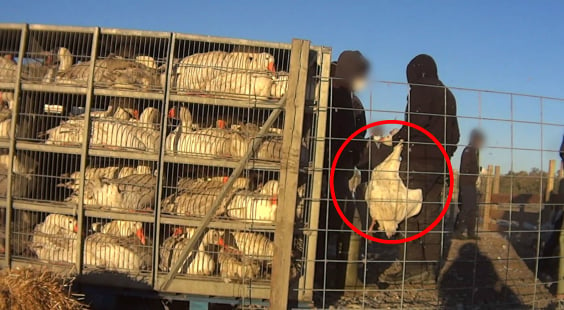
In 2017, PETA also released an exposé documenting chronic neglect of animals at Birds & Animals Unlimited (BAU), a major animal supplier for the film, television, and advertisement industries. BAU has rented out animals to hundreds of productions, including The Hangover, Marley & Me, Game of Thrones, and Pirates of the Caribbean. Following our complaint, the USDA cited BAU for multiple violations of the federal Animal Welfare Act, including failing to supply veterinary care to pigs who were suffering from skin conditions, lameness, and overgrown hooves and failing to supply bedding to dogs who were left outside overnight.
2017/2018
Following a 10-year PETA campaign that included three eyewitness investigations in South America, Israel banned the importation of beef from slaughterhouses that use the “shackle and hoist” method of kosher slaughter. Following that historic victory, the largest U.S. kosher certifier, the Orthodox Union, announced that it would also no longer accept beef from slaughterhouses that use that archaic and cruel method.
2018
PETA’s video exposé of the mohair industry—the world’s first behind-the-scenes look into it—revealed egregious abuse in South Africa, the world’s top mohair producer. After learning from us that mohair is stolen from terrified angora goats—who are often cut open during shearing, dragged, thrown by the legs and tails, and mutilated before being killed—more than 300 brands around the world banned the fiber. Zara, Topshop, Gap, ASOS, Ralph Lauren, Diane von Furstenberg, Brooks Brothers, Crate & Barrel, Esprit, Forever 21, Express, and UNIQLO are just a few of the companies that have done so. The National Council of SPCAs also filed cruelty-to-animals charges against four angora goat farmers based on PETA Asia’s evidence.
2019
Snickers’ and Birch’s stories broke millions of people’s hearts after PETA released footage of a kennel operated by former Iditarod champion John Baker and by fellow Iditarod musher Katherine Keith (who has had two dogs die during the race). Thanks to PETA’s investigator, the world saw that Snickers—kept chained near the icy sea, limping, crying, and without any shelter—had been left to pace in circles all day and that the paralyzed Birch had been denied veterinary care, despite having incurred a severe spinal cord injury.
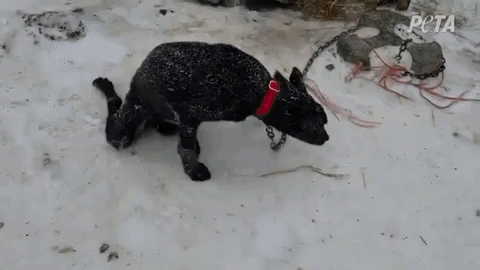
Also in 2019, in the first South Korea prosecutions of their kind, a supervisor, a worker, and the Jeju Livestock Cooperative Association were fined for killing horses in front of each other (in violation of South Korea’s Animal Protection Act) following PETA’s investigation into the beatings and killing of horses at the country’s largest horse slaughterhouse. In addition, the Korea Racing Authority created a retirement plan and started funding a program to reduce the number of horses going from the racetrack to the dinner table.
2020
It was the PETA Asia investigation heard round the world: Monkeys in Thailand are kept chained and forced to climb trees to pick coconuts that are used to make coconut milk and other products. But after PETA Asia blew the lid off the Thai coconut industry’s use of captive monkeys, more than 26,000 stores—including chains Wegmans, Costco, Walgreens, Food Lion, and Stop & Shop—have banned coconut milk brands that use coconuts picked by monkeys.
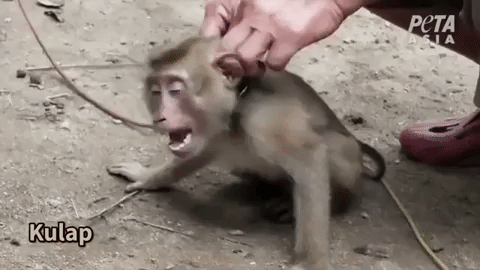
Also in 2020, PETA became the first ever to expose the alpaca-wool industry. Our undercover investigation into one of the world’s largest alpaca fiber producers revealed that crying alpacas—including pregnant ones—were roughly shorn, cut open, and left bleeding from deep wounds. Using our findings, we persuaded major companies—including UNIQLO, Overstock.com, and ESPRIT—to make the compassionate decision to ban the material.
Help PETA Uncover and Expose More Cruelty to Animals
The progress and victories above are just a fraction of our achievements since 1980, and none of them would have been possible without the diligent work of PETA’s Cruelty Investigations Department and its dedicated field investigators. If you think you have the courage and wherewithal to work on the front lines as a field investigator, we want to hear from you:
If behind-the-scenes support is more your speed, no worries—you can still help PETA and our field investigators expose and end cruelty to animals. Consider donating to help supply our investigators with the equipment necessary for them to document animal abuse.
Join PETA’s 40th anniversary party: Celebrate our bold work to save animals—sing along, dance along, dine along, and laugh along from home—with over 1,000 fellow revelers, revolutionaries, and surprise guests. Click below to get your tickets.

